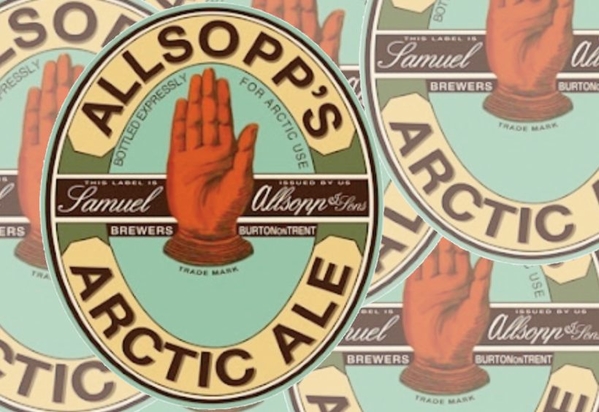Taste of history: ale brewed for the Arctic
Added: Monday, May 11th 2020

From the Archive: first posted 1 March 2011
I got that tingle of excitement in February that only history can create. I was present at the opening of a bottle of beer that had been brewed in 1875. As the cork was eased from the neck of the dusty, Champagne-sized bottle, the small group gathered round the table all asked the same question: "Will it be drinkable?"
The event was held in the National Brewery Centre in Burton-on-Trent and the man wielding the corkscrew was Steve Wellington, right, who runs the new William Worthington craft brewery in the centre. Steve has a large collection of old beers from the Bass stable, including King's Ale from 1902. But this beer was new to him as it was brewed not by Bass but by its major 19th century rival in Burton, Samuel Allsopp.
The beer in question is Arctic Ale and its history is not only fascinating but is also overlain by tragedy. In 1845 Rear-Admiral Sir John Franklin led an expedition to the Canadian Arctic in an attempt to chart and navigate the North West Passage from the Atlantic to the Pacific. The mission failed. The ships foundered and were lost, and the crew died. Franklin became a national hero and Queen Victoria demanded that efforts be made to find any remains of the ships or the crew. Along with the Admiralty, the queen asked brewers in Burton, famous for their strong beers exported round the world, to create a "life sustaining ale" - vitamin B helps prevent scurvy - to supply five ships commanded by Sir Edward Belcher. He led an expedition in 1851 to find any clues to what had happened to the Franklin mission.
Bass, Salt, Truman and Worthington competed to produce the beer but the contract was awarded to Allsopp's. Belcher failed to find any remains of the Franklin expedition. Two bottles of Arctic Ale from 1851 exist but are in the United States. In 1857 Allsopp's again brewed Arctic Ale for a second search for Franklin led by Sir Leopold McClintock. He was also unsuccessful and, as far as anyone knows, no bottles of beer from that year exist. But Arctic Ale was brewed once more in 1875 for Sir George Nares's expedition to locate the North Pole - and a treasure trove of bottles of that brew was found in Burton late last year.
Allsopp's merged in 1935 with the neighbouring Ind Coope brewery, which later became part of the Allied Breweries group. When Allied left brewing, the former Allsopp's brewery was turned into the offices of Punch Taverns and passed to the Spirit Group. When the cellars were inspected last year, dozens of bottles of old beer were discovered, including some samples of Arctic Ale from 1875.
The discovery created enormous interest among beer lovers. An American craft brewer, Christopher Bowen, happened to be in Burton at the time and he was allowed to take a few bottles back to the U.S. to have the beer and yeast analysed. He plans to recreate Arctic Ale and take a consignment to the Canadian Arctic.
Last month, May Arthur of the local branch of CAMRA - who has been working with an archivist at the Allsopp plant -- arrived at the brewery centre with Jason Potts, who has been liaising closely with Chris Bowen in the U.S. Potts was carrying a bottle of Arctic Ale as though his life depended on it. Steve Wellington joined us armed not only with his trusty corkscrew but with two other bottles of beer. One was Arctic Global Warmer, a 15% recreation of the style brewed by John Pilling at the North Cotswold Brewery, and a Bass King's Ale dating from the coronation of Edward VII in 1902. His beer is based on Bass No 1, which is not an Arctic Ale but the style known as Old Burton, a beer widely exported in the 18th and 19th centuries. The beer had a fresh tobacco aroma with a yeasty/Marmite note, with sweet malt in the mouth, rich fruit and spicy hops. The finish was bittersweet with soft, rich malt, burnt fruit and hops.
As he opened the bottle of King's Ale, Steve Wellington told us it was 10.5% alcohol and it was an all-malt beer, with no added brewing sugar, plus six pounds of Fuggles and Goldings hops - that's an enormous amount of hops. Only pale malt was used and the deep amber/tawny colour was the result of a lengthy, 12-hour boil with hops during which time some of the malt sugars turned to caramel. It was also based on Bass No 1.
It was wonderfully drinkable, with a massive vinous fruit aroma similar to Madeira, followed by more rich fruit in the mouth with a hint of peppery hops, and a dry finish with molasses, caramel, toffee, burnt fruit and light hops.
Then came the moment of truth. Steve Wellington drew the cork from the bottle of Arctic Ale and poured small samples into our glasses. It was dark amber in colour and had an astonishingly complex aroma of dry chocolate, cocoa powder, molasses and vinous fruit. The palate offered creamy malt, sweet fruit and further chocolate and cocoa hints, followed by a bittersweet finish with dark fruit, rich malt and light hops. It was, we all agreed, the best beer of the three.
I'm told there may be some Queen Victoria Silver Jubilee beers in the Allsopp's cellar and a further tasting may take place.
S








